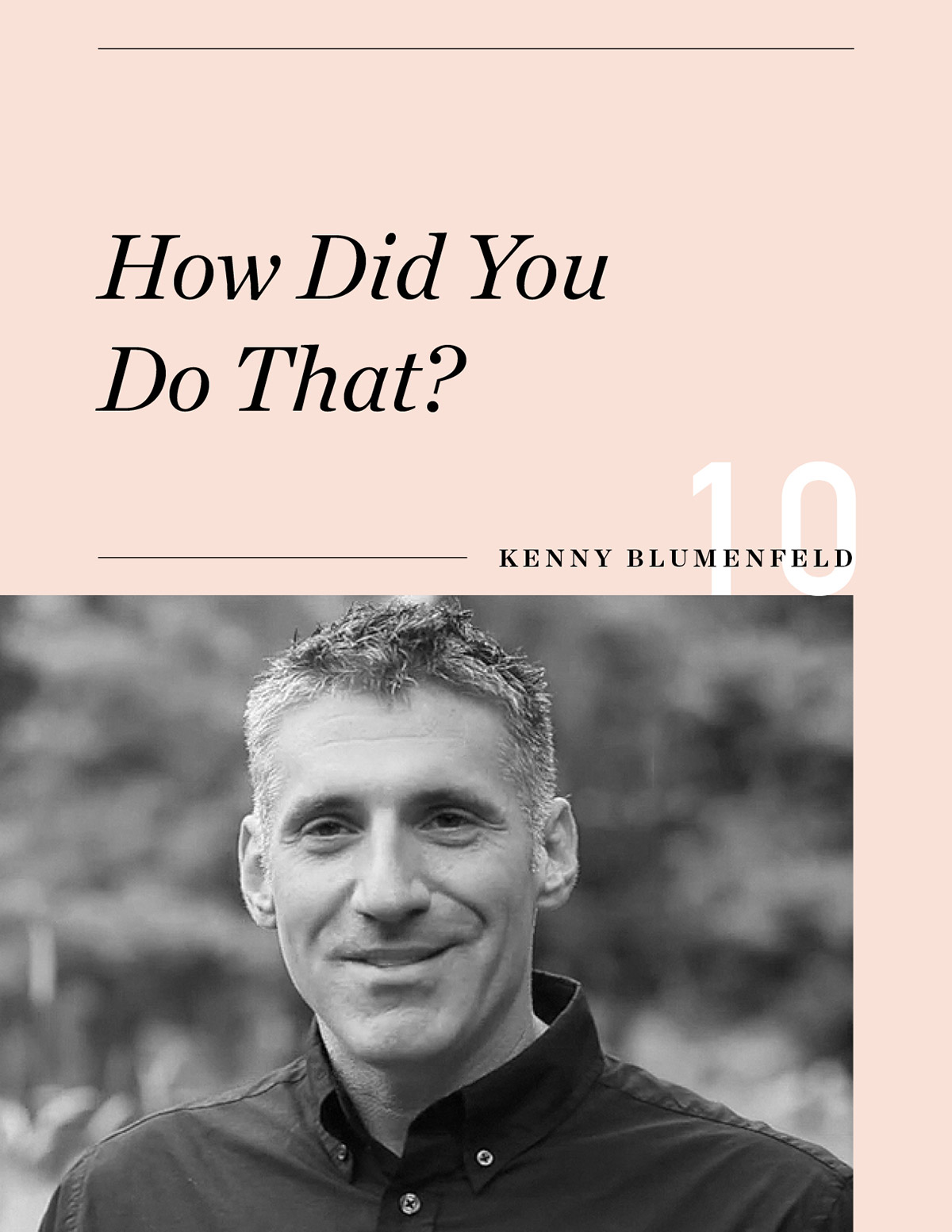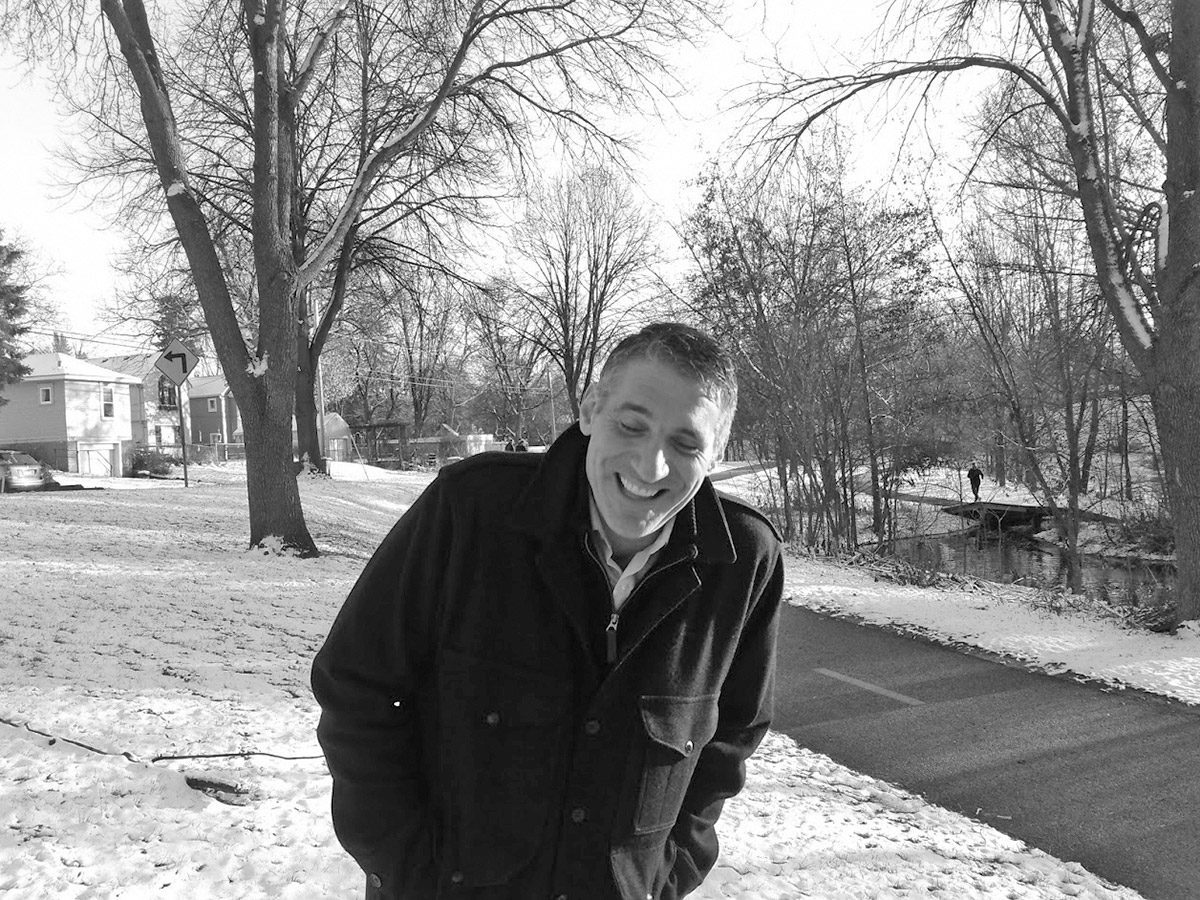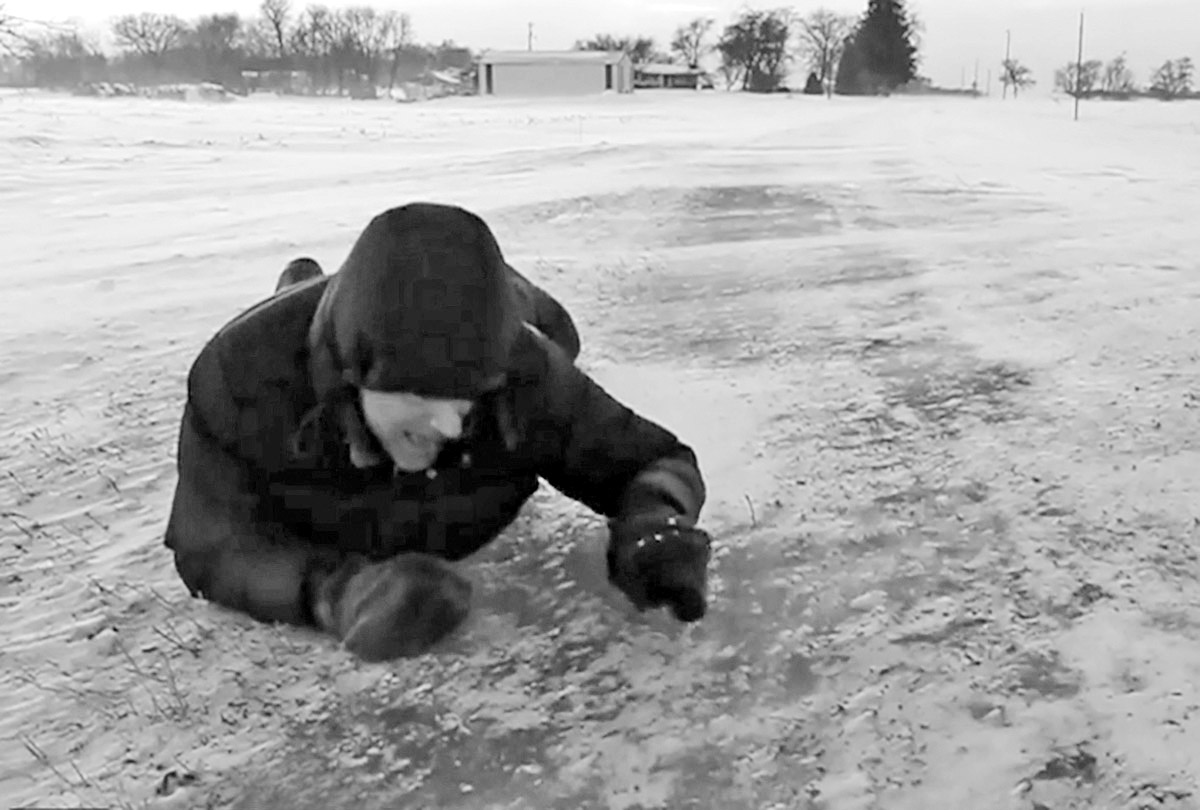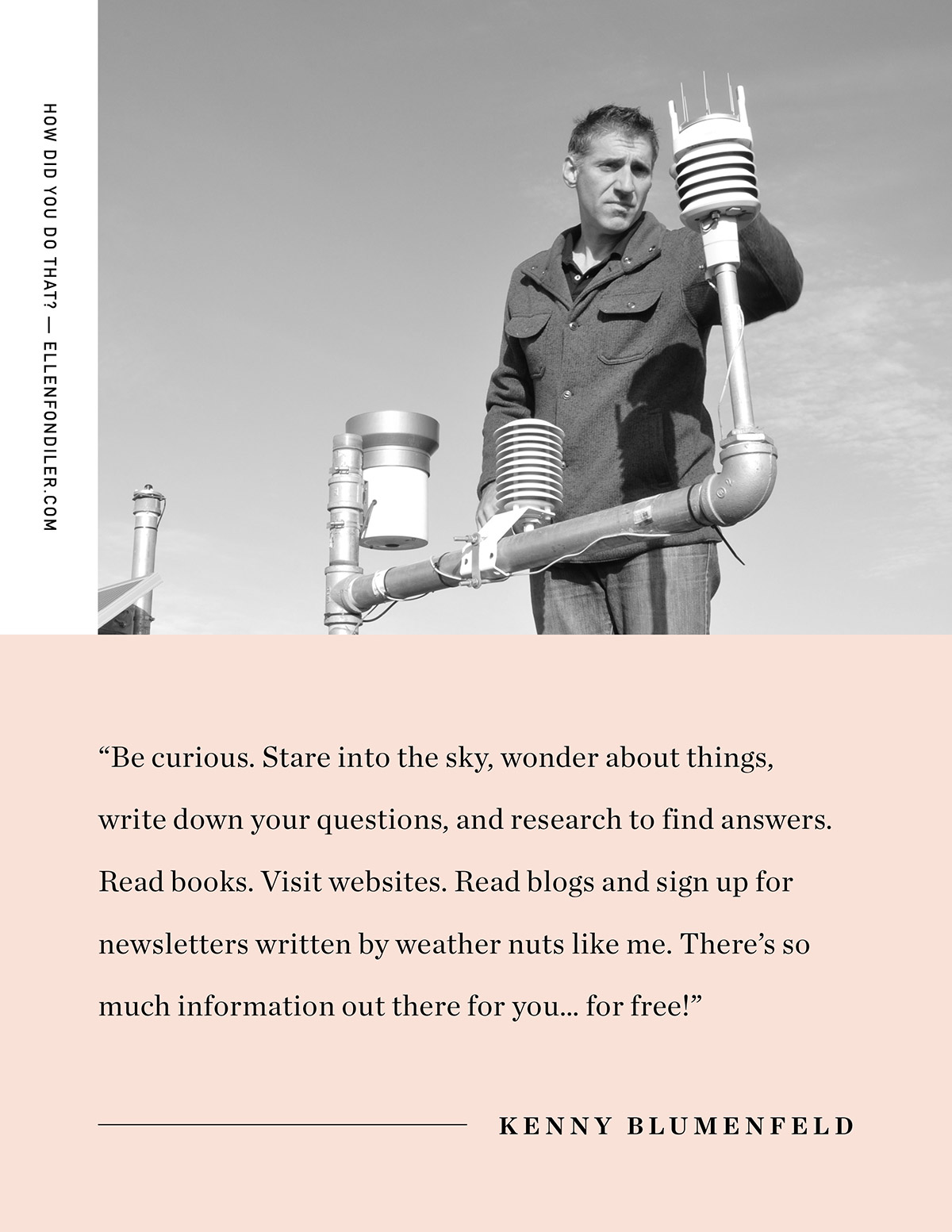
Whenever I meet someone who’s got a really cool job, who runs a thriving business, or who has completed an amazing project, I always want to know: “How did you do that?”
I’m always curious to hear the “behind-the-scenes story”—who they emailed, what they said, how they got their first client, how they got their foot in the door—the exact steps that they took to achieve their goal.
HOW DID YOU DO THAT? is an interview series where we get to hear the REAL story behind someone’s success—not the polished, neat and tidy version.
To see a complete list of all the interviews that have been completed to date, head over here.

Name: Dr. Kenneth (“Kenny”) Blumenfeld
Location: Minneapolis, Minnesota
Profession: Senior Climatologist for the Minnesota Department of Natural Resources
You’re a meteorologist. You study hazardous weather conditions—things like tornadoes and extreme snowstorms. That’s such a fascinating career! I’m sure lots of people have asked you, “How did you become a meteorologist?” Did you just wake up one morning and decide, “I want to study weather patterns”? Walk us through the sequence of events.
I absolutely adore the weather—being in it, observing it, thinking about it, talking about it. I’ve been this way since I was very young. I can’t help it.
I grew up in Minnesota, which has legendary winters and sees its share of thunderstorms, tornadoes, floods, and other weather hazards. Some of my most powerful early memories are of the sky turning heavy and purple, and of the civil defense sirens sounding, and people running to their basements. That terror definitely hooked and fascinated me. So basically, once my obsession with garbage trucks ended around age five, it was Weather Forever.
When I hear “meteorology,” I immediately picture a stereotypical “weather guy” on TV, giving storm updates in a raincoat out on a blustery street corner. Aside from becoming a TV weather reporter, what else can you do with a degree in meteorology? What are the job opportunities that people can pursue?
TV meteorologists are certainly the most visible and best-known atmospheric scientists—that’s what the field is called—but working on TV is definitely not the only career option.
The weather has become an industry unto itself, with a wide array of public and private-sector research scientists, technology developers (we’re talking everything from forecasting apps to billion-dollar satellite systems), computer programmers, and of course, forecasters.
The US government employs thousands of forecasters and research scientists who work at 150+ offices and laboratories, and who provide the backbone of everything you see on a TV weather segment or get on your app. Without that government component, we’d all know a lot less about the weather.
Hundreds if not thousands of atmospheric scientists work at universities and research laboratories, too. The private sector is booming as well, with forecasting firms, technology companies, and gigantic contracting firms that build the weather equipment and infrastructure for the government.
So yes, there’s a lot you can do with a degree in atmospheric science. Reporting live from a windy street corner is just one of many options.

You dropped out of college because you hated studying—especially for math classes. But then after drifting around for a while, you re-enrolled and decided to give college another try. The second time around, you really applied yourself, and you wound up earning your Bachelor’s degree, followed by a Master’s and a Ph.D. How did you do that? What was different for you the second time around? Did you have a different mindset? Different habits? What changed for you?
If I ever write a book about my life, it will have to be called DON’T DO WHAT I DID. Seriously, aspiring meteorologists: don’t do what I did!
Although I’ve had a lifelong obsession with the weather, I was never an outstanding student. Truly, I was horrible. The absolute worst. I underachieved chronically. I rarely started—let alone finished—my homework, and I barely made it out of high school.
When I got to college (how I even got in is another story altogether), there were no miracles. I still stunk at school, and since meteorology is mathematically intensive, I found I really stunk at math. I got kicked out of college on academic grounds after my first year. I appealed, got re-admitted, and was kicked out for good the very next semester.
My poor discipline had caught up with me. I moved home and tried to figure out what my future would be like if I wasn’t working in some kind of weather-related profession. It was agonizing, and I knew that I had broken my own heart. I didn’t know what to do with myself, and I felt no sense of purpose.
I spent two years working food service jobs, relocating a couple times, and generally faking my way through life—pretending like I didn’t care about studying weather anymore, which wasn’t true at all. After awhile, I realized that my fake ambitions were leading me nowhere. So I took many deep breaths, decided that I wanted the weather back in my life, and developed a very long-term plan to try it again.
This time, I got specific. I knew I wanted to take my fascination with the atmosphere all the way. I understood I had a lot to learn, that it was going to be a treacherous path because of all my terrible studying habits, and that I would need to keep working the entire time to cover the costs. I was 22. I set a goal of obtaining a Ph.D. in meteorology—or some closely related field—by the time I was 35. It was a long timeline, but I wanted to do it right, and I had a lot of obstacles to clear first.
Once I hammered out the plan, I enrolled in a life-changing class about becoming a better student. That’s where I learned—for the first time—how to take notes, how to break assignments into steps, how to start and finish things, how to manage time, what to do when you’re stuck, and how to view the professor as an ally. In other words, I learned skills most people have developed by middle school. It was demoralizing progress, but progress nonetheless.
Then I started taking real college classes, one at a time for a year, then two at a time, and then three. Of course, I was still fighting the old terrible habits, and I’d fall behind constantly. It took me a while to learn to head it off by meeting with the instructor and developing a battle plan early in the semester. My biggest challenges were in math courses, which do not forgive you for past sins. If you half-ass factoring in algebra, or don’t really get those trigonometric identities, calculus will punish you relentlessly until you get it right.
It took three years for me to earn enough credits and build up a decent enough record to get admitted as a full-time undergraduate student. This was a big deal for me, and I dove all the way in. I participated in and formed student groups, went to research seminars, joined a multi-year field research project, took interesting and challenging courses, wrote a successful research grant proposal, and got to know my professors. After five semesters, I had developed a good reputation, had won a couple awards, and graduated with a bruised but acceptable grade-point average.
I rode my newfound momentum into graduate school, where I had a clean slate. It took me about three years to complete my Master’s degree, and at age 35, I received my Ph.D., right on schedule!
All together, it took 13 years to cross the finish line—while navigating my first marriage, the birth of my two kids, a divorce, working day jobs to support my family, and tons of pressure and upheaval—but I made it. Completing that Ph.D. program felt really special.

3 Things
If someone is interested in becoming a meteorologist, what are the first 3 things they should do?
1. Ask yourself very honestly, “Do I really want to do this professionally? Or would this be better as a hobby for me?”
A lot of people just want to know more about the weather, which you can do without going to college. The Internet is brimming with information that can help you be the smartest weather enthusiast at the party.
2. Improve your math skills, because you will be using them heavily.
Math is often the gatekeeper that determines who continues on and becomes a meteorologist, and who majors in something else but lives on as a weather hobbyist. (There is no shame in the latter!)
3. Consume information.
Be curious. Stare into the sky, wonder about things, write down your questions, and research to find answers. Want to know why your area has been so wet/dry/hot/cold/stormy? Why did it snow 400 miles to your north but rain where you live? Why does the wind shift directions? What do different clouds mean? Read books. Visit websites. Read blogs and sign up for newsletters written by weather nuts like me. There’s so much information out there for you… for free!
For general weather, I recommend the Weather Underground Category 6 blog (https://www.wunderground.com/
If you’re really curious about something, why wait to get formal training to learn about it? You can start now.
ONE MORE THING…
Do you have “one more quick question” that you’d like to ask Kenny? Email me and tell me what you want to know! I might choose your question for my ONE MORE THING… Podcast (Coming soon!!!)
YOUR #1 CAREER GOAL: ACHIEVED
Do you need some encouragement to help you achieve a big, daunting career goal? Would you like to have a career coach/strategist in your corner—feeding you ideas that you’d never considered before, helping you figure out who to contact, and what to say, and checking in to make sure you don’t procrastinate? If so… click here to find out how we can work together. I’d love to coach you!
![]()
